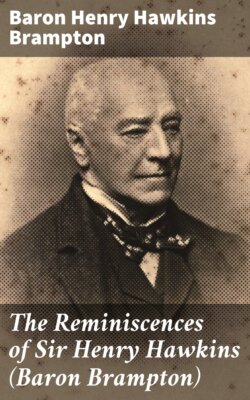Читать книгу The Reminiscences of Sir Henry Hawkins (Baron Brampton) - Baron Henry Hawkins Brampton - Страница 32
На сайте Литреса книга снята с продажи.
"CODD'S PUZZLE."
ОглавлениеHaving somewhat succeeded in my practice at Quarter Sessions, I enlarged my field of adventure by attending the Old Bailey, hoping, of course, to obtain some briefs at that court; and although I abandoned the practice as a rule, I was, in after-life, on many occasions retained to appear in cases which are still fresh in my memory. I was with Edwin James, who was counsel for Mr. Bates, one of the partners of Strahan and Sir John Dean Paul, bankers of the Strand, and who were sentenced to fourteen years' transportation for fraudulently misappropriating securities of their customers. I was counsel for a young clerk to Leopold Redpath, the notorious man who was transported for extensive forgeries upon the Great Northern Railway. The clerk was justly acquitted by the jury.
My recollection of this period brings back many curious defences, which illustrate the school of advocacy in which I studied. Whether they contributed to my future success, I do not know, but that they afforded amusement is proved by my remembering them at all.
Hertford and St. Albans were my chief places, my earliest attachments, and are amongst my pleasantest memories. It seems childish to think of them as scenes of my struggles, for when I come to look back I had no struggles at all. I was merely practising like a cricketer at the nets; there was nothing to struggle for except a verdict when it would not come without some effort.
But dear old Codd was the man to struggle. He struggled and wriggled; tie him up as tightly as you could, you saw him fighting to get free, as he did in the following great duck case. He was a very amiable old barrister, a fast talker—so fast that he never stayed to pronounce his words—and of an ingenuity that ought to have been applied to some better purpose, such as the making of steam-engines or writing novels, rather than defending thieves. He reminded me on this occasion of the man in the circus who rode several horses at a time. In the case I allude to, he set up no less than seven defences to account for the unhappy duck's finding its way into his client's pocket, and the charm of them all was their variety. Inconsistency was not the word to apply reproachfully. Inconsistency was Codd's merit. He was like a conjurer who asks you to name a card, and as surely as you do so you draw it from the pack.
This particular duck case was known long after as "Codd's Puzzle."
"First," says Codd, "my client bought the duck and paid for it."
He was not the man to be afraid of being asked where.
"Second," says Codd, "my client found it; thirdly, it had been given to him; fourthly, it flew into his garden; fifthly, he was asleep, and some one put it into his pocket." And so the untiring and ingenious Codd proceeded making his case unnaturally good.
But the strange thing was that, instead of sweeping him away with a touch of ridicule, the young advocate argued the several defences one after the other with great dialectical skill, so that the jury became puzzled; and if the defence had not been so extraordinarily good, there would have been an acquittal forthwith.
There had been such a bewildering torrent of arguments that presently Codd's head began to swim, and he shrugged his shoulders, meaning thereby that it was the most puzzling case he had ever had anything to do with.
At last it became a question whether, amidst these conflicting accounts, there ever was any duck at all. Codd had not thought of that till some junior suggested it, and then he was asked by the Marquis of Salisbury, our chairman, whether there was any particular line of defence he wished to suggest.
"No," says Codd, "not in particular; my client wished to make a clean breast of it, and put them all before the jury; and I should be much obliged if those gentlemen will adopt any one of them."[A]
The jury acquitted the prisoner, not because they chose any particular defence, but because they did not know which to choose, and so gave the prisoner the benefit of the doubt.
The client was happy, and Codd famous.
[Footnote A: Sixty years after this event, in the reply in the great Tichborne case, Mr. Hawkins, Q.C., quoted this very defence as an illustration of the absurdity of the suggestion that one of several Ospreys picked up Sir Roger Tichborne—as will hereafter appear.]
